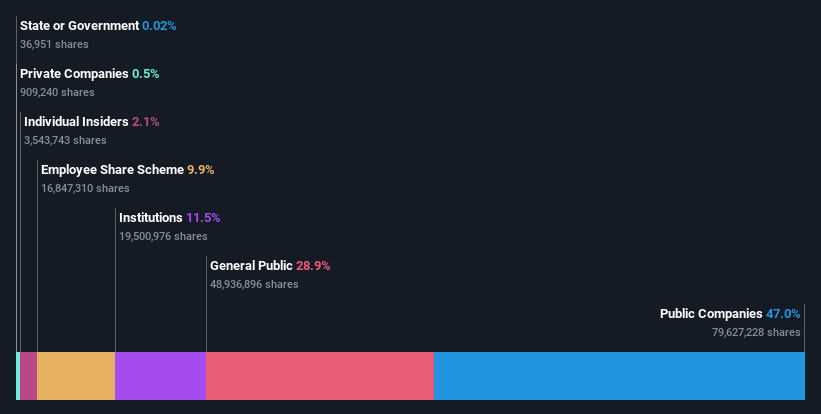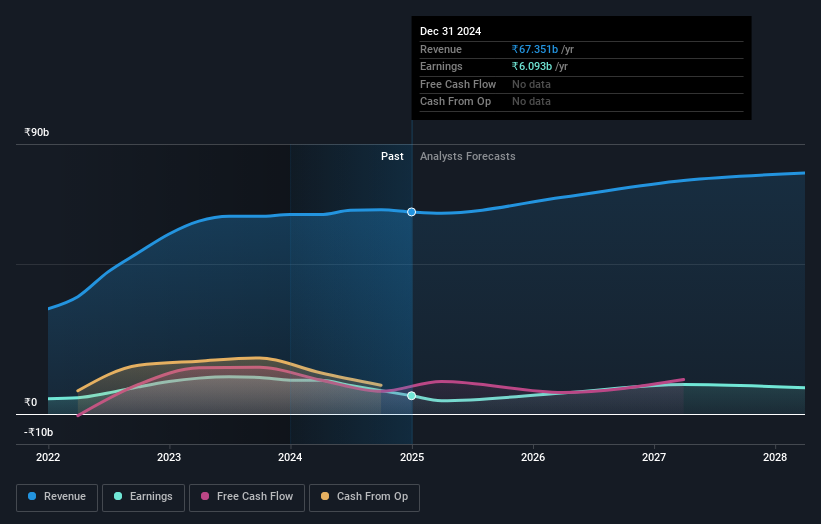- India
- /
- Paper and Forestry Products
- /
- NSEI:JKPAPER
JK Paper Limited's (NSE:JKPAPER) last week's 7.8% decline must have disappointed public companies who have a significant stake
Key Insights
- The considerable ownership by public companies in JK Paper indicates that they collectively have a greater say in management and business strategy
- The top 2 shareholders own 57% of the company
- Institutions own 12% of JK Paper
Every investor in JK Paper Limited (NSE:JKPAPER) should be aware of the most powerful shareholder groups. And the group that holds the biggest piece of the pie are public companies with 47% ownership. That is, the group stands to benefit the most if the stock rises (or lose the most if there is a downturn).
And following last week's 7.8% decline in share price, public companies suffered the most losses.
Let's take a closer look to see what the different types of shareholders can tell us about JK Paper.
Check out our latest analysis for JK Paper

What Does The Institutional Ownership Tell Us About JK Paper?
Institutional investors commonly compare their own returns to the returns of a commonly followed index. So they generally do consider buying larger companies that are included in the relevant benchmark index.
JK Paper already has institutions on the share registry. Indeed, they own a respectable stake in the company. This implies the analysts working for those institutions have looked at the stock and they like it. But just like anyone else, they could be wrong. If multiple institutions change their view on a stock at the same time, you could see the share price drop fast. It's therefore worth looking at JK Paper's earnings history below. Of course, the future is what really matters.

JK Paper is not owned by hedge funds. Bengal & Assam Company Limited is currently the company's largest shareholder with 47% of shares outstanding. Meanwhile, the second and third largest shareholders, hold 9.9% and 2.6%, of the shares outstanding, respectively.
After doing some more digging, we found that the top 2 shareholders collectively control more than half of the company's shares, implying that they have considerable power to influence the company's decisions.
Researching institutional ownership is a good way to gauge and filter a stock's expected performance. The same can be achieved by studying analyst sentiments. Quite a few analysts cover the stock, so you could look into forecast growth quite easily.
Insider Ownership Of JK Paper
While the precise definition of an insider can be subjective, almost everyone considers board members to be insiders. Management ultimately answers to the board. However, it is not uncommon for managers to be executive board members, especially if they are a founder or the CEO.
Insider ownership is positive when it signals leadership are thinking like the true owners of the company. However, high insider ownership can also give immense power to a small group within the company. This can be negative in some circumstances.
Shareholders would probably be interested to learn that insiders own shares in JK Paper Limited. It has a market capitalization of just ₹53b, and insiders have ₹1.1b worth of shares, in their own names. Some would say this shows alignment of interests between shareholders and the board. But it might be worth checking if those insiders have been selling.
General Public Ownership
The general public-- including retail investors -- own 29% stake in the company, and hence can't easily be ignored. While this size of ownership may not be enough to sway a policy decision in their favour, they can still make a collective impact on company policies.
Public Company Ownership
It appears to us that public companies own 47% of JK Paper. This may be a strategic interest and the two companies may have related business interests. It could be that they have de-merged. This holding is probably worth investigating further.
Next Steps:
It's always worth thinking about the different groups who own shares in a company. But to understand JK Paper better, we need to consider many other factors. For example, we've discovered 2 warning signs for JK Paper that you should be aware of before investing here.
But ultimately it is the future, not the past, that will determine how well the owners of this business will do. Therefore we think it advisable to take a look at this free report showing whether analysts are predicting a brighter future.
NB: Figures in this article are calculated using data from the last twelve months, which refer to the 12-month period ending on the last date of the month the financial statement is dated. This may not be consistent with full year annual report figures.
New: Manage All Your Stock Portfolios in One Place
We've created the ultimate portfolio companion for stock investors, and it's free.
• Connect an unlimited number of Portfolios and see your total in one currency
• Be alerted to new Warning Signs or Risks via email or mobile
• Track the Fair Value of your stocks
Have feedback on this article? Concerned about the content? Get in touch with us directly. Alternatively, email editorial-team (at) simplywallst.com.
This article by Simply Wall St is general in nature. We provide commentary based on historical data and analyst forecasts only using an unbiased methodology and our articles are not intended to be financial advice. It does not constitute a recommendation to buy or sell any stock, and does not take account of your objectives, or your financial situation. We aim to bring you long-term focused analysis driven by fundamental data. Note that our analysis may not factor in the latest price-sensitive company announcements or qualitative material. Simply Wall St has no position in any stocks mentioned.
About NSEI:JKPAPER
Flawless balance sheet and undervalued.
Market Insights
Community Narratives




